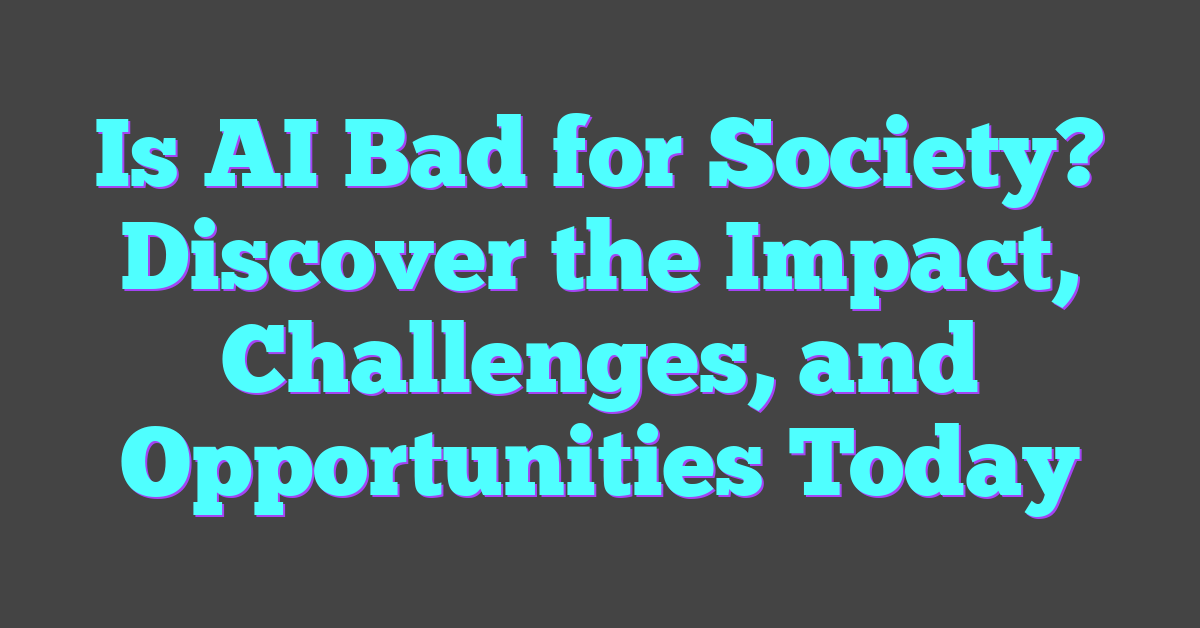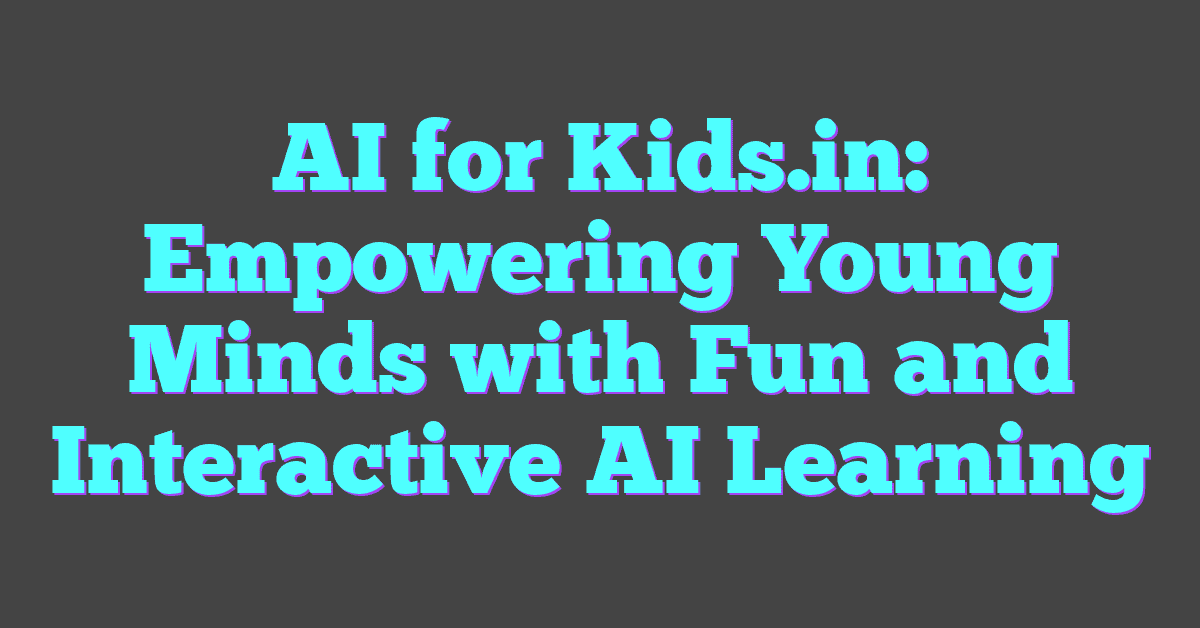Artificial Intelligence (AI) is no longer just a concept from science fiction—it’s a reality that’s rapidly transforming our world. From smart assistants like Siri and Alexa to advanced algorithms predicting our next online purchase, AI is deeply woven into the fabric of daily life. But with this rapid integration comes a question that’s sparking heated debates: Is AI bad for society?
While AI brings numerous benefits, such as increased efficiency and new technological advancements, it’s also raising ethical and social concerns. People worry about job displacement, privacy issues, and the potential for biased decision-making. As we navigate this new landscape, it’s crucial to weigh the pros and cons to understand AI’s true impact on society.
The Rise of Artificial Intelligence
Artificial Intelligence (AI) has seen exponential growth, transforming from a niche field to a mainstream technology. Its integration into various sectors has changed how we interact with the world.

Defining Artificial Intelligence
Artificial Intelligence refers to computer systems designed to perform tasks typically requiring human intelligence. These tasks can include speech recognition, decision-making, and language translation. AI achieves this through algorithms and machine learning models that process vast amounts of data to identify patterns and make predictions. Machine learning, a subset of AI, involves training these systems to learn from data, improve over time, and adapt to new inputs.
Historical Perspectives on AI Development
The development of AI can be traced back to the mid-20th century. In 1956, the term “artificial intelligence” was coined at the Dartmouth Conference, where researchers explored the possibility of creating machines that could simulate human intelligence. The 1960s and 1970s saw the development of early AI programs, such as ELIZA, a natural language processing program capable of simulating conversation.
Significant breakthroughs occurred in the following decades. In the 1980s, expert systems, which used rule-based logic to emulate the decision-making process of human experts, gained popularity. By the 1990s and early 2000s, advancements in computational power and data availability led to the rise of machine learning algorithms. AI systems like IBM’s Deep Blue, which defeated chess champion Garry Kasparov in 1997, demonstrated the potential of AI in complex problem-solving.
Today, AI continues to evolve rapidly, driven by advancements in deep learning and neural networks. These technologies enable AI systems to process and analyze data at unprecedented scales, leading to innovations in fields such as healthcare, finance, and autonomous transportation. The growth of AI presents both opportunities and challenges, making it a crucial area of study and development.
Potential Benefits of AI to Society
AI offers myriad advantages, enhancing daily life and driving progress across various fields. Key benefits can be seen in several areas.
Efficiency and Automation
AI significantly enhances operational efficiency by automating repetitive tasks. Robots in manufacturing, for instance, streamline production lines, reducing human error and increasing output. In customer service, AI-powered chatbots handle queries 24/7, providing instant support and freeing human agents for complex issues. Financial institutions leverage AI for fraud detection, sifting through vast data to identify unusual patterns and flagging potential threats in real-time. This transformation allows businesses to save time and reduce costs.
Advancements in Healthcare and Research
AI drives breakthroughs in healthcare by improving diagnostics and treatment plans. Machine learning algorithms analyze medical images with high accuracy, identifying diseases like cancer in early stages. Personalized medicine benefits from AI, tailoring treatments based on individual genetic profiles. Virtual health assistants, powered by AI, offer 24/7 patient monitoring, sending alerts to healthcare providers about critical changes. In research, AI accelerates drug discovery by predicting molecular behavior, cutting the time and cost of bringing new medications to market. Such advancements promise better patient outcomes and more efficient medical practices.
Concerns About AI in Society
As AI technology continues to advance, several concerns about its impact on society have emerged. These concerns, ranging from ethical issues to privacy risks, necessitate careful consideration and proactive management.
Ethical Implications
AI’s integration in various sectors raises important ethical questions. These concerns include:
- Bias and Fairness: Algorithms can unintentionally inherit biases from the data used to train them. When biased data shapes AI models, it can lead to unfair treatment in areas like hiring, lending, and law enforcement. For example, facial recognition systems have shown higher error rates for people with darker skin tones.
- Transparency: Many AI systems operate as “black boxes,” making it difficult to understand how they make decisions. This lack of transparency can hinder accountability and trust, especially in high-stakes scenarios like healthcare diagnoses or judicial sentencing.
- Autonomy and Control: With AI systems becoming more autonomous, there’s a growing concern about the erosion of human control. Ensuring AI applications remain within ethical boundaries requires robust oversight mechanisms.
Privacy and Security Risks
AI’s capabilities present notable privacy and security challenges:
- Data Privacy: AI systems often rely on vast amounts of personal data to function effectively. This dependency raises significant privacy concerns, as individuals’ data can be collected, stored, and potentially misused without their explicit consent. For instance, personalized advertising relies heavily on user data, sometimes leading to invasive practices.
- Cybersecurity Threats: As AI systems become more integrated into critical infrastructure, they also become potential targets for cyberattacks. AI-driven cybersecurity tools can defend against threats, but they can also be exploited by malicious actors to launch sophisticated attacks, increasing the stakes in cybersecurity.
- Surveillance: The use of AI for surveillance purposes by governments and private entities can lead to an erosion of civil liberties. While surveillance technologies can enhance security, they can also infringe on individuals’ rights to privacy and freedom if not properly regulated.
AI’s rapid progression necessitates addressing these ethical, privacy, and security concerns to ensure its positive integration into society.
The Economic Impact of AI
Artificial intelligence (AI) is reshaping the global economy, making waves in various industries. The economic implications are profound, influencing both job markets and new business models.
Job Displacement Concerns
AI affects employment dynamics significantly. Automation technologies have displaced certain jobs. Tasks that involve routine processing, such as data entry and manufacturing, are increasingly carried out by AI-driven machines. A 2020 study by the World Economic Forum projected that by 2025, automation could displace approximately 85 million jobs. However, the study also indicated that it could create 97 million new roles, though this transition poses challenges.
New Job Creation Possibilities
In contrast to job displacement, AI also spurs the creation of new employment opportunities. Roles in AI development, machine learning engineering, and data science are becoming crucial. For instance, healthcare AI technologies have generated new positions such as AI diagnostic specialists. Companies investing in AI innovation need workers proficient in AI design, implementation, and maintenance.
By investing in employee retraining programs and educational initiatives, societies can better prepare for the economic shifts brought about by AI. Enhanced skills for the workforce can mitigate the risks of displacement and leverage the new opportunities AI introduces.
Through these dynamics, AI contributes to economic growth while requiring careful management of labor markets and skill development strategies.
Regulatory and Legal Aspects of AI
Examining regulatory and legal aspects of AI reveals how different governments and international bodies approach this transformative technology. Policies and cooperation play crucial roles in shaping AI’s impact on society.
Government Policies on AI
Government policies on AI vary by region and influence how AI integrates into different sectors. The European Union (EU) has established the Artificial Intelligence Act to ensure transparency and accountability in AI applications. In the United States, the National AI Initiative Act aims to coordinate AI research and development across agencies, prioritizing innovation while managing risks. China emphasizes AI’s strategic importance, integrating AI heavily into its Five-Year Plans to drive economic growth and technological superiority.
International Perspectives and Cooperation
AI regulations require international cooperation to address global challenges. The Global Partnership on AI (GPAI) fosters collaboration among nations, focusing on responsible AI development. The Organisation for Economic Co-operation and Development (OECD) promotes the implementation of the OECD AI Principles, which guide international AI policies toward human-centric outcomes. Collaborative efforts ensure that ethical standards and best practices transcend borders, promoting trust in AI technologies worldwide.
Conclusion
AI’s journey from fiction to reality has brought both excitement and apprehension. While it offers incredible benefits and opportunities, it also poses significant challenges that society must address. By proactively managing AI’s impact through retraining programs and thoughtful regulations, we can harness its potential for good. Global cooperation and ethical standards are essential to navigate the complexities of AI. As we move forward, a balanced approach will ensure that AI serves humanity’s best interests, fostering innovation while safeguarding societal values.
Frequently Asked Questions
What are the key benefits of Artificial Intelligence (AI)?
AI enhances efficiency, automates repetitive tasks, and enables data-driven decision-making. It also improves customer experiences through personalized services and contributes to advancements in healthcare, finance, and other sectors.
How has AI evolved over time?
AI has evolved from science fiction concepts to practical, transformative technology. Key milestones include the development of early algorithms, machine learning, and more recently, advanced neural networks and deep learning.
What economic impacts does AI have?
AI can lead to job displacement in some sectors while creating new opportunities in AI-related fields. It enhances productivity and drives economic growth by enabling innovative solutions and services.
What are the societal concerns related to AI?
Societal concerns include job displacement, privacy issues, bias in AI algorithms, and the ethical implications of autonomous systems. Effective management and regulations are necessary to address these concerns.
How can we manage the impact of AI on the workforce?
Proactive management is essential, including investing in retraining programs, promoting lifelong learning, and fostering adaptability to ensure that workers can transition to new roles created by AI advancements.
What are the regulatory and legal aspects of AI?
Different governments approach AI regulation with varying focuses: the EU emphasizes transparency, the US prioritizes innovation and risk management, and China focuses on integrating AI into economic growth strategies. International cooperation is also crucial.
How do international organizations contribute to AI development?
Organizations like the Global Partnership on AI and the OECD help establish ethical standards and best practices for AI development, fostering international cooperation and alignment on regulatory approaches and innovation goals.




